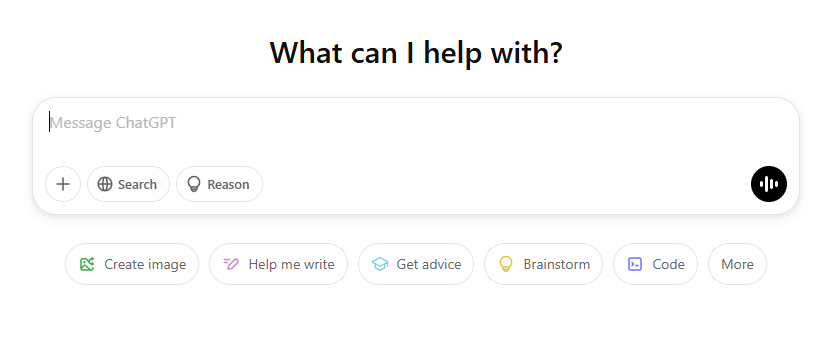 ChatGPT
ChatGPT
 Grok
Grok
 Perplexity AI
Perplexity AI

4 min read | By Postpublisher P | 12 February 2025 | Chatgpt
How has ChatGPT improved with Deep Search? The blog makes a sweep through OpenAI’s ChatGPT has significantly advanced with the introduction of “Deep Search,” enhancing its ability to provide real-time, accurate information. This feature was initially released to Pro users on February 2, 2025, allowing ChatGPT to access the web dynamically, thereby bridging knowledge gaps. By AI-powered research capabilities, Deep Search, ChatGPT offers timely and relevant responses to users, which puts it as a very powerful competitor to the traditional search engines. It’s more than just a chatbot — it’s a real-time AI research assistant that can browse, analyze, and even code to support your research. This is an improvement on OpenAI’s continuous development and innovation in artificial general intelligence.
𝑻𝒉𝒆 𝑫𝒆𝒆𝒑 𝑹𝒆𝒔𝒆𝒂𝒓𝒄𝒉 𝑴𝒐𝒅𝒆𝒍 𝑮𝒐𝒕 26.6% 𝑨𝒄𝒄𝒖𝒓𝒂𝒄𝒚 𝑾𝒊𝒕𝒉 𝑩𝒓𝒐𝒘𝒔𝒊𝒏𝒈 𝑨𝒏𝒅 𝑷𝒚𝒕𝒉𝒐𝒏 𝑻𝒐𝒐𝒍𝒔, 𝑴𝒖𝒄𝒉 𝑯𝒊𝒈𝒉𝒆𝒓 𝑻𝒉𝒂𝒏 𝑮𝑷𝑻-4’𝒔 3.3% 𝒂𝒏𝒅 𝒐3-𝒎𝒊𝒏𝒊 (𝒉𝒊𝒈𝒉)’𝒔 13% 𝑾𝒊𝒕𝒉 𝑻𝒆𝒙𝒕 𝑶𝒏𝒍𝒚.
OpenAI’s Advanced Deep Research handles complex work. It uses advanced tools like browsing and Python coding to find accurate answers and solves human-level problems. Unlike regular AI models, this system can research topics deeply, analyze data, and generate more precise results.
It offers better performance than standard AI models like GPT-4 due to the exclusive additional tools that are available for a better understanding. This AI becomes useful to researchers, developers, and the business community for gettin g detailed insights. It helps in coding, AI research assistant, web browsing and data analysis. Hot off the press, and would be a mullti-tool AI agent for someone who would benefit from profound research, was OpenAI’s Advanced Deep Research
ChatGPT Web Search lets you find real-time news, stock updates, and more. OpenAI has removed the sign-in requirement, so anyone can use it.

The strategic use of ChatGPT for comprehensive research may prove to be quite efficient. If you’re aiming for comprehensive, multi-layered research, here’s how to make the most of ChatGPT:
𝐃𝐞𝐟𝐢𝐧𝐞 𝐭𝐡𝐞 𝐑𝐞𝐬𝐞𝐚𝐫𝐜𝐡 𝐎𝐛𝐣𝐞𝐜𝐭𝐢𝐯𝐞: Be specific in What are you looking for? Technical description, marketplace trends, or scientific insights?
𝐔𝐬𝐞 𝐏𝐫𝐞𝐜𝐢𝐬𝐞 𝐐𝐮𝐞𝐫𝐢𝐞𝐬: Ask specific, detailed questions to get more accurate responses.
𝐄𝐧𝐚𝐛𝐥𝐞 𝐀𝐝𝐯𝐚𝐧𝐜𝐞𝐝 𝐓𝐨𝐨𝐥𝐬: These advanced tools in ChatGPT Pro make a huge difference when parsing data or fetching citations.
𝐕𝐞𝐫𝐢𝐟𝐲 𝐈𝐧𝐟𝐨𝐫𝐦𝐚𝐭𝐢𝐨𝐧: Cross-check ChatGPT’s answers with reliable sources for any research that requires extensive work
𝐀𝐧𝐚𝐥𝐲𝐳𝐞 𝐚𝐧𝐝 𝐒𝐮𝐦𝐦𝐚𝐫𝐢𝐳𝐞:Use ChatGPT to break down complex topics into simple summaries.
𝐂𝐨𝐦𝐩𝐚𝐫𝐞 𝐌𝐮𝐥𝐭𝐢𝐩𝐥𝐞 𝐒𝐨𝐮𝐫𝐜𝐞𝐬:Ask for different perspectives and research papers on a topic.
𝐈𝐭𝐞𝐫𝐚𝐭𝐞 𝐚𝐧𝐝 𝐑𝐞𝐟𝐢𝐧𝐞: Rephrase your prompts for deeper insight or clarification. This is where ChatGPT’s multi-step reasoning truly shines.
By following these steps, you can maximize ChatGPT’s potential for deep research.

| Feature | Description |
|---|---|
| Advanced Tools | Uses browsing and Python coding tools to enhance reasoning capabilities. |
| High Precision | Answers in the finest detail, enabled by advanced tools. |
| In-Depth Analysis | Examines complex topics with easy-to-understand parts. |
| Improved Problem-Solving | Capable of solving human-level problems that basic AI tools overlook. |
| Real-Time Information | Accesses the latest research and developments through browsing. |
| Multi-Tool Integration | Integrates various tools to improve the efficiency and depth of the research. |
Deep research does much more than simply access free-standing information. While searches only find that info quickly, deep research analyzes sources, synthesizes results, and derives insights into complex problems. Such procedures receive refreshed enhancement in the use of the latest GPT o3 model, which accelerates contextual comprehension as well as well-reasoned conclusions. Deep research handles complex work that traditional search can’t — it explains, connects, and reasons across data points. It also builds on the latest GPT o3 model, which boosts contextual accuracy and nuanced output. Searches yield results based on algorithms and keywords, without consideration of deep explorations. Essentially, deep research produces a more profound understanding than does simply a search.
Emphasis is the critical approach to analysis and synthesis of information.
Requires authentication by corroborative source
Goes deeper into exploration thus uses more theory-expert knowledge
Purpose is to derive useful insights or solve complex problems.
Searches rely on basic keyword-based algorithms for instant results.
OpenAI built Deep Research to meet the growing demand for multi-step research tasks performed autonomously by AI. It’s part of OpenAI’s long-term commitment to building reasoning-capable AI assistants that go beyond mere content retrieval and move into real analytical work.
Beyond just searching, the deep research capabilities of ChatGPT go beyond traditional search methods, offering tools such as browsing and Python coding for more accuracy and problem-solving. OpenAI API pricing is also another important consideration for those using it at scale. It is an incredibly powerful resource for researchers, developers, and businesses because it can analyze a complex topic, cross-reference several sources, and give detailed insights into the matter at hand. These features enable users to receive comprehensive, actionable information that informs better decision-making for deep research in many fields. It’s a true transformation of ChatGPT into a next-generation AI research agent, and for anyone looking to dig deeper than surface-level results, ChatGPT’s Deep Research may be the most powerful tool available in 2025.
Join over 150,000+ subscribers who get our best digital insights, strategies and tips delivered straight to their inbox.